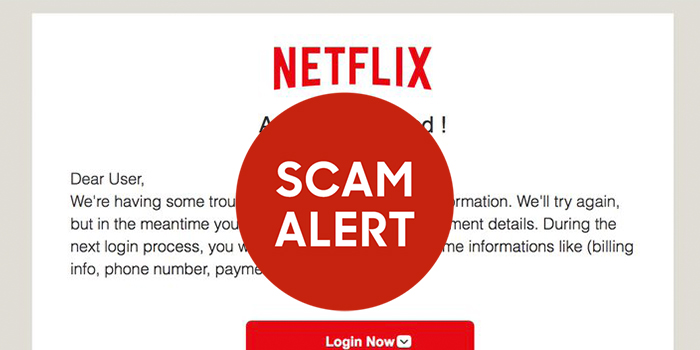Business News: Phishing on the Rise
There is Netflix scam going around. It was discovered last Tuesday, September 26. This is a phishing scam. Phishing is the fraudulent practice of sending emails purporting to be from reputable companies in order to induce individuals to reveal personal information, such as passwords and credit card numbers.
Customers were receiving emails that were purported to be from Netflix soliciting their account information. The email informs users their accounts have been disabled and recommends they update their payment details. The email then directs them to a login page where victims are asked to enter their account information. This email is signed by “Aleksandar.” There is currently no Netflix executive with that name.
If you receive this email, do not click the link. Instead immediately report the email to Netflix. Netflix’s Help Center directly states that it will never send an email such as that one asking for payment. They also recommend that if you have received the email and clicked the link that you immediately change your Netflix password and inform your bank that the account may have been compromised.
Netflix, on their website, has page about how to protect your account. There is a specific section about being careful of possible phishing attempts. They talk about the definition of phishing. Netflix also gives a warning about the lengths phishers will go to. The ultimate goal of phishers in to take over your account or steal your personal information. They will even go as far as to create fake websites that look like Netflix. There are pieces of information that you can be assured that Netflix will not ask for over email. Netflix will never ask for payment information over email. They will never ask for your social security number, identification number, or tax identification number. Netflix will also not ask for your account password over email.
There are two ways for users to contact Netflix about this. If you have received one of these phishing emails, contact their Help Center. If you are nervous about the privacy of your information you can go to their website and look up their Privacy Statement. These measures should help you come out on top over phishers and reassure yourself about the privacy of your information. Finally, the best way to keep your information safe is to change your password periodically. Passwords are best when they are at least eight characters long, have a mix of uppercase and lowercase letters, and include numbers and symbols. This is good advice for all online accounts that have private information. Changing your password often is a good way to stay safe on the internet.
The best consumer is an aware consumer. Keep an eye out for phishing scams and other scams. It is important to be careful when opening emails and to know what to do if you do get a fraudulent email. Keep safe and keep a wary eye on for attempts to steal your private information. Also remember that most companies will have a policy and people to contact if you do get a fraudulent number. Never blindly click an email. Be a good consumer and keep a weathered eye out.











